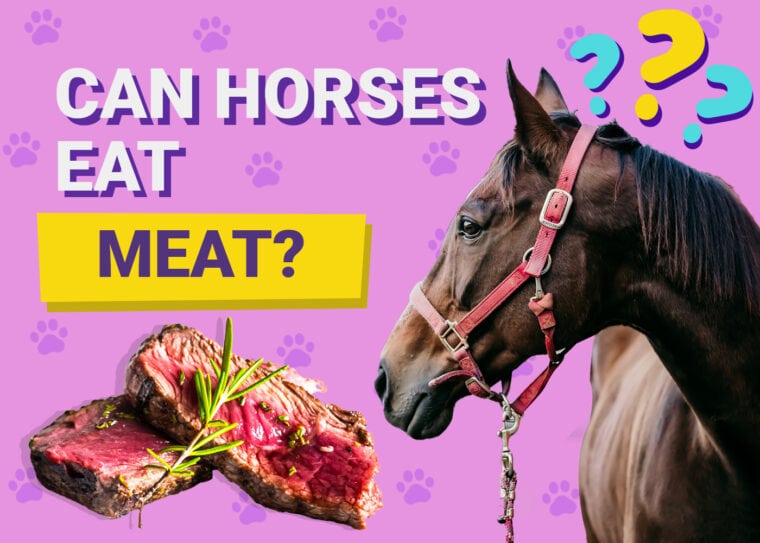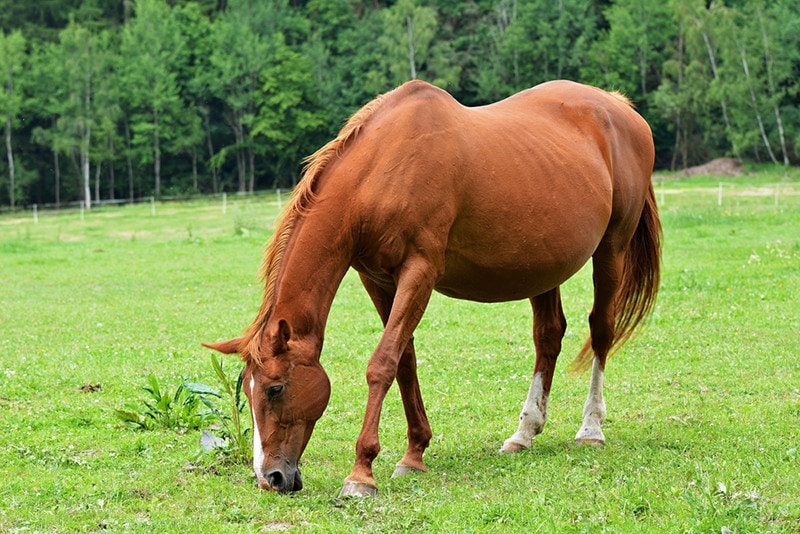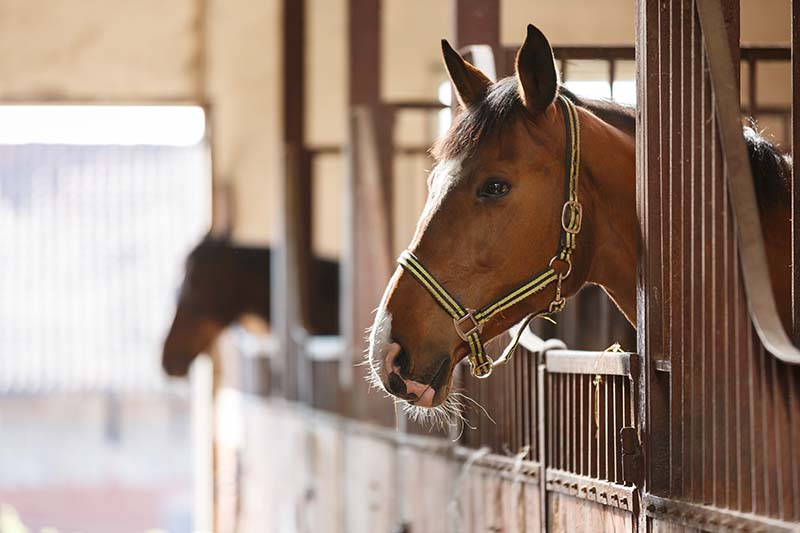
Hoses and humans have been intertwined for thousands of years. The term “beast of burden” came from horses that have done more than their fair share of work for us over the centuries. Horses entertain us, thrill us, and provide companionship to many people. In times of dire need, horses have also provided humans with meat.
One question many people have about equines is if the reverse is true; can horses eat meat? Yes, meat is safe for horses, and some have been known to do so with enthusiasm, but they should not be fed meat. It’s not normal for a horse to eat meat as a herbivore. One look at their digestive system indicates that horses were made to eat plants. We have interesting facts about the honorable herbivores and their desire for plants below.
Should You Feed Meat to a Horse?
Veterinarians would agree that, no, you should not feed meat to horses. A horse’s digestive tract (GI tract) is not designed to digest meat, and its teeth are not made to tear and chew meat.
Horses have large, flat teeth that are worn down while they graze and chew. In the front of their mouths, horses have large incisors perfectly adapted to cutting grass and vegetation. A horse’s digestive system is suited to digest vegetation and grass and the massive amount of fiber they contain. Their GI tract is long, and a horse can absorb all the nutrients in the plants they eat over a longer time. Carnivores have very short GI tracts in comparison, and food passes through rather quickly.

Do Horses Eat Meat in the Wild?
It is rare for a horse to eat meat in the wild, although they have been known to kill and eat small animals under dire circumstances such as a harsh winter, drought, etc. That’s typical of most herbivores that will do whatever it takes to survive, even if it might not sit well in their stomach. There have never been any accounts of horses hunting down animals together or feeding off a dead animal’s carcass. Yes, horses travel in packs (technically, herds), but they do so for safety and companionship, never to hunt for prey.
Can Horses Digest Meat?
A horse’s digestive system can digest meat, but not very well. Unlike carnivores that eat and excrete their food in 8 to 10 hours, a horse’s digestive system takes more than double that time. That’s according to Dr. Gary Potter, who was a former professor of equine science at Texas A&M University. Dr. Potter says, “As a rule of thumb, it takes 24 hours for food to pass completely through the horse’s digestive system.”
This inability of horses to digest and absorb nutrients from meat can lead to grave health problems if they eat meat long-term. Lastly, horses rely on an entire ecosystem of bacteria in their digestive system to digest the plants, hay, grasses, and other plant-based foods they consume. Introducing meat to that ecosystem can provoke devastating changes to the “good” bacteria that, if severe enough, can cause the horses’ demise.

What Happens if a Horse Eats Meat?
The good news is that, as they are enormous creatures, a tiny amount of meat is unlikely to hurt a horse. If, for example, they get curious and snatch away part of your hotdog, the chance of an adverse reaction is low.
That’s not to say you should feed your horse a bite of meat here and there, even if they seem to like it. Veterinarians and equine experts advise against giving your horse meat as a snack for any reason or under any circumstances. The risks are too great that the meat will upset the delicate ecosystem in their GI tract and lead to unhealthy results. An accidental curious nibble is likely no big deal, but giving your horse meat on purpose, even in small amounts, is not recommended.
Why Would a Horse Eat Meat?
In the wild and domesticated, there have been instances recorded where horses have eaten meat. These occurrences, however, are not the norm and are usually caused by extreme or unnatural situations. In Iceland, for example, horse owners feed their horses dried fish in winter to supplement their protein intake. Speaking of winter, if a horse is extremely hungry and has no other choice in the dead of the season, it will sometimes kill and eat small animals like birds and rodents.
As we’ve seen, domesticated horses may sneak a bite of meat from their humans. Horses are, after all, curious animals and like to experiment and try new things. Interestingly, horses are drawn to the smell of condiments and other ingredients used on meat rather than the meat itself.

What Human Foods Aren’t Good for Horses?
Horses are designed to consume a relatively small range of plant foods, but the typical human eats an incredibly diverse range of plant and animal-based foods. Some foods can be problematic for a horse, while others can be deadly. Below is a list of the human foods you should keep far away from your equine friend.
Final Thoughts
As we’ve learned today, horses can and sometimes do eat meat, but it’s usually under extreme and unusual circumstances. Horses are herbivores whose digestive system is made to eat plants, not animals, and the horse’s teeth are made for cutting and chewing plants. Their digestive system is long, so their body has the chance to extract all the minerals, vitamins, and nutrients from them. For the average horse, meat of any kind is unnecessary under normal circumstances.
A tiny amount won’t usually cause problems, but feeding meat to a horse regularly, or all at once in a large amount, could cause severe and life-threatening health problems.









